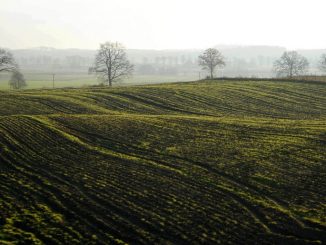
Op-Ed by Marco Contiero (Greenpeace) 3 July 2018
A little-known panel in the European Parliament will rule later this week on a procedural issue that could make or break the EU’s most expensive and arguably most environmentally destructive policy. The leaders of the Parliament’s different political groups will end a bitter row between MEPs over which committees should be given a meaningful role in the reform of the EU’s common agricultural policy (CAP).
Food, farming and rural issues take up a big part of the EU’s budget, and have a major impact on the environment and people’s health. But the CAP reinforces a very specific type of farming – bigger, more industrialised and more environmentally destructive. The impact of this farming model is not a secret: the European countryside is falling silent, as songbirds and other wildlife disappear, toxic chemicals are leaching into the soil and polluting rivers, and farming-related carbon emissions are growing. So, what can be done?
A first step is to involve as broad a spectrum of expertise as possible in the reform of the CAP. On a basic level, this means recognising that agriculture affects a lot more than just the livelihoods of farmers.
The good news is that the environment and climate change are central to the framing of the new CAP, as drafted by the European Commission. It therefore seems obvious that the European Parliament’s environment, health and food safety committee should play a prominent role in the reform, alongside the agriculture committee. However, the agriculture committee is reluctant to relinquish full control of the file.
Members of the environment committee requested a say on two of the three regulations that make up the CAP reform package (opens pdf) released by the Commission on 1 June: the draft regulation on CAP strategic plans and the draft regulation on the common organisation of markets in agricultural products
The environment committee argues that since the EU Amsterdam Treaty and the previous agriculture policy reform of 2003, the CAP has covered a whole new range of areas, including policies related to environmental protection, pesticides and fertilisers, public health and animal health. In fact, these changes are what allows CAP payments to farmers to continue under World Trade Organisation rules.
The environment committee stresses that several elements of the CAP reform directly concern issues that fall within its own competences, such as: climate change; air, soil and water pollution; wildlife protection; public health and food safety; and sustainable development. The environment committee therefore argues that it should work alongside the agriculture committee on issues of shared competence.
Power struggle
This request to share the CAP files provoked a strong reaction by agriculture committee chair Czesław Adam Siekierski, of the centre-right European People’s Party (EPP), igniting what some have described as a power struggle within the Parliament. On 13 June Mr Siekierski expressed “deep concern” for the request by the environment committee, which he described as “totally disproportionate”.
Mr Siekierski argued that there was no precedent for the environment committee’s involvement in the CAP reform. However, the environment committee points out that precedence is not an argument to continue a misguided practice.
The environment committee also argues that four out of the nine objectives of the CAP strategic plans that European governments will have to comply with are directly linked to health, environment and climate change issues.
The damning findings of the European Court of Auditors in their report on the CAP make the environment committee’s case even more compelling (see the court findings here and here). The Court criticised the lack of clear objectives for the CAP, in particular related to environmental performance. In its Special Report on Greening, it said that greening measures were “unlikely to significantly enhance the CAP’s environmental and climate performance”. For example, the report showed that greening requirements on crop diversification and environmentally protected areas (known as ecological focus areas) have led to a change in farming practice affecting only 2 percent of EU farmland.
A recent Greenpeace report also drew attention to the business ties of MEPs in the agriculture committee. Greenpeace recognised that, while it is important, expertise in the farming sector should not eclipse input from other experts. The NGO stressed that “agriculture has a significant impact on the environment, public health, climate change, the economy and other sectors, and yet there is a danger that experts in these fields will be prevented from playing a meaningful role in the reform of the CAP”.
The agriculture committee has shown that it is desperate to resist change. The ruling by senior MEPs on Wednesday or Thursday this week is a chance to loosen the grip of the agri-business on the reform of the CAP. Encouragingly, an in-house dispute settlement body (chaired by Cecilia Wikstroem of AEDL) has already this week recommended to these senior MEPs to share competence. It is high time for other voices to be heard, and for the EU to recognise that farming affects everyone.
Marco Contiero Greenpeace EU agriculture policy director




